人教版五年级英语上册第六单元知识点
人教版小学英语五年级上册各单元知识点
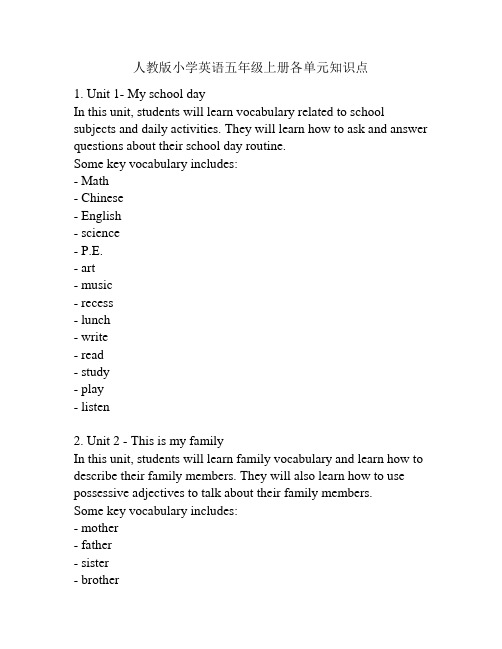
人教版小学英语五年级上册各单元知识点1. Unit 1- My school dayIn this unit, students will learn vocabulary related to school subjects and daily activities. They will learn how to ask and answer questions about their school day routine.Some key vocabulary includes:- Math- Chinese- English- science- P.E.- art- music- recess- lunch- write- read- study- play- listen2. Unit 2 - This is my familyIn this unit, students will learn family vocabulary and learn how to describe their family members. They will also learn how to use possessive adjectives to talk about their family members.Some key vocabulary includes:- mother- father- sister- brother- grandmother- grandfather- aunt- uncle- cousin- daughter- son- possessive adjectives (my, your, his, her)3. Unit 3 - At the zooIn this unit, students will learn vocabulary related to animals and their habitats. They will also learn how to talk about what animals can do (i.e. run, swim, fly, etc.).Some key vocabulary includes:- lion- tiger- elephant- giraffe- monkey- panda- kangaroo- penguin- habitat (forest, desert, ocean, etc.)- can/can't4. Unit 4 - My homeIn this unit, students will learn vocabulary related to the rooms in a house and furniture. They will also learn how to use prepositions to describe where things are in a room.Some key vocabulary includes:- living room- kitchen- bedroom- bathroom- dining room- sofa- table- chair- bed- closet- prepositions (on, under, next to)5. Unit 5 - My scheduleIn this unit, students will learn how to talk about their daily schedules and activities. They will also learn vocabulary related to time and daily routines.Some key vocabulary includes:- wake up- brush teeth- take a shower- go to school- come home- eat dinner- do homework- bed time- time (hour, minute, second)6. Unit 6 - My hobbiesIn this unit, students will learn how to talk about their hobbies and interests. They will also learn vocabulary related to differenthobbies and sports.Some key vocabulary includes:- play soccer- dance- sing- draw- swim- ride a bike- play the piano- watch TV- read books- hobby- interest7. Unit 7 - Our worldIn this unit, students will learn vocabulary related to different countries and cultures. They will also learn how to ask and answer questions about different places in the world.Some key vocabulary includes:- country- flag- language- symbol- landmark- continent- questions (What's the capital of...? What language do they speak in...?)8. Unit 8 - Let's celebrate!In this unit, students will learn vocabulary related to holidays andcelebrations. They will also learn about different traditions and customs around the world.Some key vocabulary includes:- Halloween- Thanksgiving- Christmas- New Year's Day- Valentine's Day- Easter- tradition- custom- celebrateOverall, these units will help students develop their language skills in various areas such as vocabulary acquisition, grammar usage, and communication. By the end of the fifth grade, students will have a foundation of English language that will prepare them for more complex language use in the future.In addition to the vocabulary and grammar covered in these eight units, there are also important language skills that students will develop, such as reading comprehension and writing ability. Throughout the units, students will be completing various reading activities to help them understand and contextualize the new vocabulary and grammar they are learning. They will also be practicing writing skills, such as paragraph writing and short answer responses.Reading comprehension is a vital skill for English language learners, as it helps students to understand and interpret new information. In each unit, there will be reading passages related to that unit's topic. For example, in Unit 3, students may read aboutdifferent animal habitats and learn how animals adapt to their environment. Reading comprehension activities may include reading comprehension questions, matching exercises, and writing exercises. By the end of each unit, students should have a solid understanding of the reading material and be able to answer questions related to the content.Writing is another essential skill that students will develop throughout these units. Writing exercises will be incorporated into each unit, helping students to practice writing in English and apply the new vocabulary and grammar they are learning. Some writing exercises may include writing short paragraphs about their hobbies or describing their family members. By the end of the fifth grade, students should be able to write coherent paragraphs with proper grammar, spelling, and punctuation.Speaking and listening skills will also be developed through group and partner activities in each unit. Students will be encouraged to ask and answer questions in English, and engage in conversations with their peers. They will also have opportunities to give short presentations on topics related to each unit, which will help them develop their public speaking skills.Overall, these eight units are designed to provide a comprehensive language learning experience for students in fifth grade. By the end of the program, students should be able to understand and use everyday English vocabulary and grammar in a variety of contexts. They should also be able to read and comprehend short passages, write short paragraphs independently, and engage in conversations and presentations with their peers. It is important to note thatlanguage learning is a gradual process, and students will vary in their language proficiency at the end of the program. However, with consistent practice and dedication, students in fifth grade will be well-prepared for more advanced language learning in the future.。
PEP人教版五年级上英语Unit6知识点、考点梳理精编
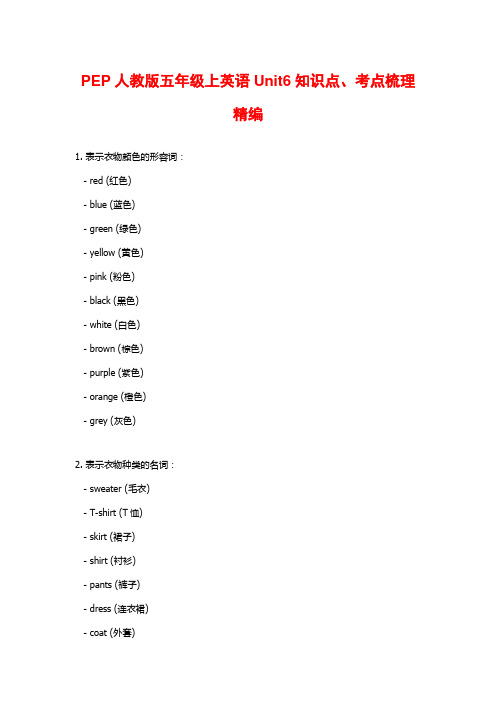
PEP人教版五年级上英语Unit6知识点、考点梳理精编1. 表示衣物颜色的形容词:- red (红色)- blue (蓝色)- green (绿色)- yellow (黄色)- pink (粉色)- black (黑色)- white (白色)- brown (棕色)- purple (紫色)- orange (橙色)- grey (灰色)2. 表示衣物种类的名词:- sweater (毛衣)- T-shirt (T恤)- skirt (裙子)- shirt (衬衫)- pants (裤子)- dress (连衣裙)- coat (外套)- jacket (夹克)- jeans (牛仔裤)3. 表示衣物穿着方式的动词短语: - put on (穿上)- take off (脱下)- wear (穿戴)4. 询问衣物颜色的句型:- What color is your sweater? - What color are your pants?5. 回答关于衣物颜色的句型:- It's red.- They're blue.6. 穿着衣物的句型:- I'm wearing a blue shirt.- She's wearing a pink dress. - He's wearing black pants.7. 表示时间的词汇:- morning (早上)- afternoon (下午)- evening (晚上)- night (夜晚)8. 表示星期的词汇:- Monday (星期一)- Tuesday (星期二)- Wednesday (星期三)- Thursday (星期四)- Friday (星期五)- Saturday (星期六)- Sunday (星期日)9. 介绍日常活动的句型:- What do you do in the morning/afternoon/evening?- I usually play sports in the afternoon.10. 询问他人日常活动的句型:- What does she/he do in the morning/afternoon/evening? - She/He usually watches TV in the evening.11. 表示日常活动的动词:- get up (起床)- have breakfast/lunch/dinner (吃早餐/午餐/晚餐)- go to school/park (去学校/公园)- do homework (做作业)- play sports/games (进行运动/玩游戏)- watch TV (看电视)- read books (读书)- go to bed (上床睡觉)12. 特殊疑问词how long:- How long does it take to get to school? (从家到学校需要多长时间?) - It takes about 15 minutes. (大约需要15分钟)。
五年级英语上册Unit6Inanaturepark单元整体分析人教PEP版
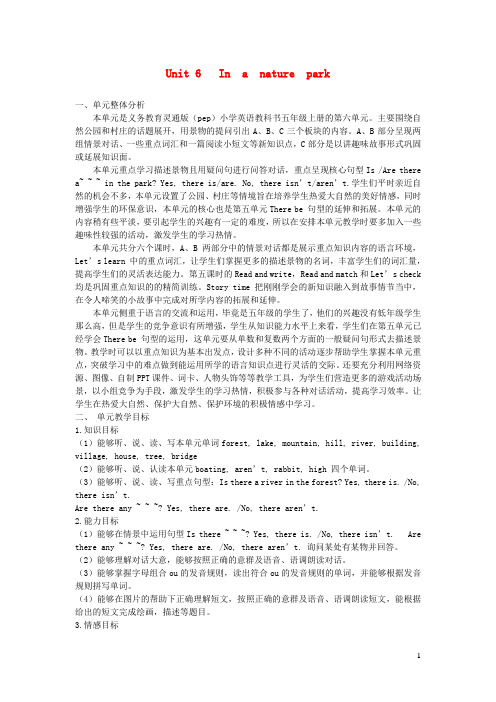
Unit 6 In a nature park一、单元整体分析本单元是义务教育灵通版(pep)小学英语教科书五年级上册的第六单元。
主要围绕自然公园和村庄的话题展开,用景物的提问引出A、B、C三个板块的内容。
A、B部分呈现两组情景对话、一些重点词汇和一篇阅读小短文等新知识点,C部分是以讲趣味故事形式巩固或延展知识面。
本单元重点学习描述景物且用疑问句进行问答对话,重点呈现核心句型Is /Are there a~ ~ ~ in the park? Yes, there is/are. No, there isn’t/aren’t.学生们平时亲近自然的机会不多,本单元设置了公园、村庄等情境旨在培养学生热爱大自然的美好情感,同时增强学生的环保意识,本单元的核心也是第五单元There be 句型的延伸和拓展。
本单元的内容稍有些平淡,要引起学生的兴趣有一定的难度,所以在安排本单元教学时要多加入一些趣味性较强的活动,激发学生的学习热情。
本单元共分六个课时,A、B两部分中的情景对话都是展示重点知识内容的语言环境,Let’s learn 中的重点词汇,让学生们掌握更多的描述景物的名词,丰富学生们的词汇量,提高学生们的灵活表达能力。
第五课时的Read and write,Read and match和Let’s check 均是巩固重点知识的的精简训练。
Story time把刚刚学会的新知识融入到故事情节当中,在令人啼笑的小故事中完成对所学内容的拓展和延伸。
本单元侧重于语言的交流和运用,毕竟是五年级的学生了,他们的兴趣没有低年级学生那么高,但是学生的竞争意识有所增强,学生从知识能力水平上来看,学生们在第五单元已经学会There be 句型的运用,这单元要从单数和复数两个方面的一般疑问句形式去描述景物。
教学时可以以重点知识为基本出发点,设计多种不同的活动逐步帮助学生掌握本单元重点,突破学习中的难点做到能运用所学的语言知识点进行灵活的交际。
五年级上册第六单元知识重点

Module 6重点知识:1.want用法:want to do sth 想要做某事want sb to do sth 想要某人做某事2.play football踢足球play basketball 打篮球3.run fast 跑得快4.Jump really high 跳得高5.win v 赢过去式won winner 获胜者6.get eighty points 得80分get 过去式got7.the other 另一个(两者当中的另一个)I have two friends . One is in Beijing , and the other is in Shanghai .There are two books on the desk . One is Chinese and the other is English .8.am/is 过去式was are 过去式were9.well 副词好(用来修饰动词)good 形容词:好(用来修饰名词)Tom can play football well . / Tom is a good boy .10.Seventy 70 sixty – four 64 forty 40 thirty-six 36 thirteen 18 twenty-one 21 eighty 80 twenty 20重点句子:1.Do you want to play football ?你想要打篮球吗?2.Can you run fast ?你能跑得快吗?3.You can play basketball well . 你打篮球打得好。
4.They got seventy points . 他们得了70分。
5.I can’t play well . 我打(篮球)得不好。
can的用法:can是情态动词没有人称和数的变化,后面接动词原形:肯定句:Tom can play football .否定句:Tom can’t play football .一般疑问句:Can Tom play football ?特殊疑问句:What can Tom do ?。
人教版五年级上册英语unit6考点解析
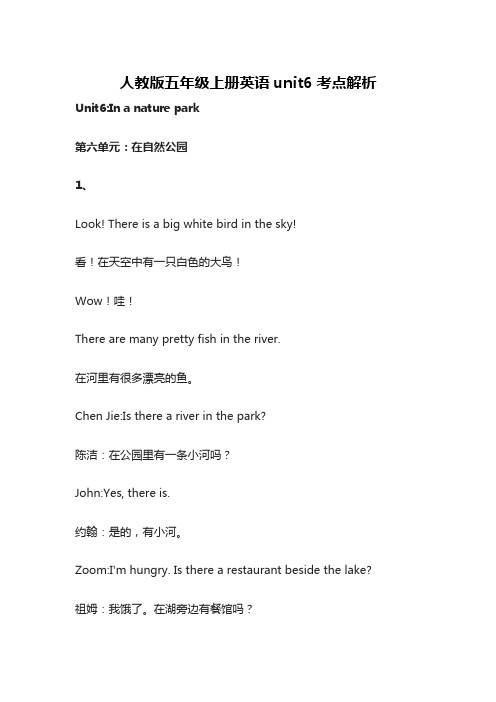
人教版五年级上册英语unit6考点解析Unit6:In a nature park第六单元:在自然公园1、Look! There is a big white bird in the sky!看!在天空中有一只白色的大鸟!Wow!哇!There are many pretty fish in the river.在河里有很多漂亮的鱼。
Chen Jie:Is there a river in the park?陈洁:在公园里有一条小河吗?John:Yes, there is.约翰:是的,有小河。
Zoom:I'm hungry. Is there a restaurant beside the lake?祖姆:我饿了。
在湖旁边有餐馆吗?Zip:No, there isn't.Look! I have some food. Let's share.吉普:不,没有,看!我有一些食物。
我们一起分享。
2、Let's try让我们试试What is in the park? Listen and tick the word you hear. 公园里有什么?听并在你听到的单词前打对勾。
(V)forest森林()lake湖()river小河3、Let's talk让我们谈谈Miss White: Children, let's go to the forest!怀特小姐:孩子们,让我们去森林!Children: Yeah!孩子们:耶!Zhang Peng: Is there a river in the forest,Miss White?张鹏:怀特小姐,森林里有一条河吗?Miss White: No, there isn't.怀特小姐:不,没有河。
Zhang Peng: Is there a lake, Miss White?张鹏:怀特小姐,那有湖吗?Miss White: Yes, there is and there are some small boats.怀特小姐:是的,有湖并且还有一些小船。
人教版五年级上册英语六个单元复习汇总

五年级上册英语知识点复习汇总Name:Class:Team:U1What’s he like?四会单词:必须会背会默old老的young年轻的funny滑稽的kind和蔼的strict要求严格的(书写错误率高)polite有礼貌的,客气的hard-working工作努力的(连字符不能省)helpful有用的,愿意帮忙的clever聪明的shy害羞的出现在课本上的两个单词friendly友好的quiet安静的重点句子:(会背会默)-Who’s your English teacher?你的英语老师是谁? -Miss White.-Is she kind?她和蔼吗?-Yes,she is./No,she isn’t.是的,她很和蔼。
/不,她不和蔼。
What’s she like?他怎么样?She’s kind.他很和蔼各学科老师的常用写法:英语老师English teacher数学老师maths teacher音乐老师music teacher美术老师art teacher科学老师science teacher校长the head teacher以下句子要求熟读,并会翻译。
He can speak Chinese and English.他会说汉语和英语。
He makes me finish my homework.他让我完成我的家庭作业。
He is very helpful at home.他在家里很爱帮助人。
He is a good football player.他是一个好的足球运动员。
本单元的几对反义词old youngkind stricttall shortthin strongMr Mrs Miss Ms四个词的区别:Mr泛指所有的男士Mrs已婚女士Ms婚姻状况不明的女士Miss未婚女士(只有Mr代表男士,其他三个都是女士)谚语(了解即可)You can’t judge a book by its cover.不能以貌取人。
Unit6必备知识(复习讲义)-五年级英语上册单元速记巧练(人教PEP版)

二、句子
1.—Is there a river in the forest, Miss White?
—No,there isn’t.
2.—Are there any tall buildings in the nature park?
7.there, the, a, nature, house, is, near, park (.)
_________________________________________________________
8.river, the, there, a, forest, is, in (?)
_________________________________________________________
3.Are there any ducks in the park.C.公园里有很多人。
4. There is a small river beside the forest.D.这幅画中有湖吗?
5.Are there any pictures in the picture?E.湖附近有很多高楼。
重点词句默写答案
12.去划船
13.兔;野兔
15.去划船
17.在公园里
19.在村庄附近
21.很多漂亮的鱼
23.去森林
25.在那边
27.在高山前
14.高的
16.自然公园
18.在湖边
20.在高山上
22.一些食物
24.看一看
26.在河里
28.一只白色的大鸟
二、句子
1.—怀特小姐,森林里有河吗?
人教版小学五年级上册英语知识点【1-6单元】
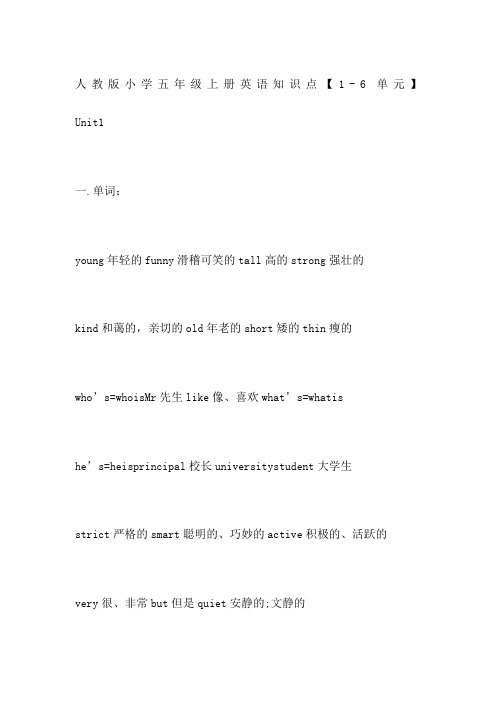
人教版小学五年级上册英语知识点【1-6单元】Unit1一.单词:young年轻的funny滑稽可笑的tall高的strong强壮的kind和蔼的,亲切的old年老的short矮的thin瘦的who’s=whoisMr先生like像、喜欢what’s=whatishe’s=heisprincipal校长universitystudent大学生strict严格的smart聪明的、巧妙的active积极的、活跃的very很、非常but但是quiet安静的;文静的she’s=sheis二.句子:1.A:Who’syourEnglishteacher你的英语老师是谁B:MrCarter.卡特先生.2.He’sfromCanada.他来自加拿大。
3.A:What’shelike他什么样B:He’stallandstrong.他又高又壮。
He’sveryfunny.他很滑稽。
(Who,What引导的特殊疑问句,用来对不熟悉的老师进行问答:Who's+某人What'she/shelikeHe/Sheis+与身体特征和性格特征有关的形容词。
)4.A:W ho’sthatyounglady/那个年轻的女士是谁B:She’sourprincipal.她是我们的校长。
5.Ihaveanewmathteacher.我有一位新数学老师。
6.Herclassissomuchfun.她的课非常有趣。
7.She’sauniversitystudent.她是一名大学生。
8.A:Isshequiet她很安静吗B:No,sheisn’t.She’sveryactive.不是的。
她很活跃的。
(Is引导的一般疑问句,谈论某位老师是否具有某方面的特征:Ishe/she+与身体特征和性格特征有关的形容词,回答用:Yes,he/sheis.No,he/sheisn't.)9.A:Isshestrict她很严格么B:Yes,sheis,butshe’sverykind.是的,但她很和蔼的。
五年级上册英语人教版(PEP)第六单元知识点
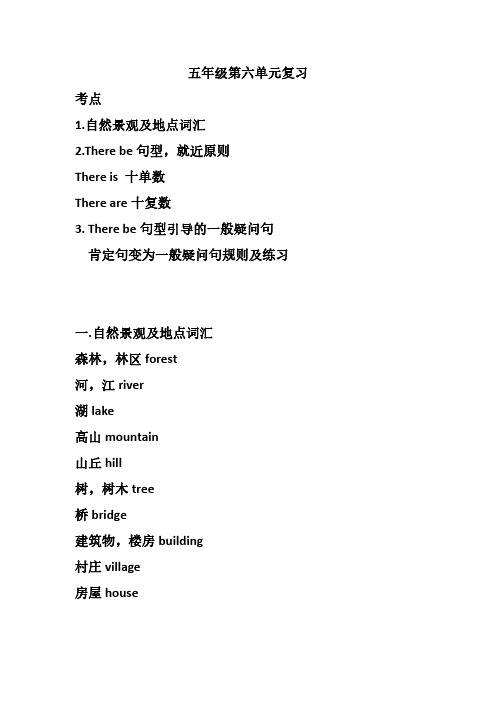
五年级第六单元复习考点1.自然景观及地点词汇2.There be句型,就近原则There is十单数There are十复数3.There be句型引导的一般疑问句肯定句变为一般疑问句规则及练习一.自然景观及地点词汇森林,林区forest河,江river湖lake高山mountain山丘hill树,树木tree桥bridge建筑物,楼房building村庄village房屋house二.There be句型,就近原则句型There is+a/an+物品(单数)+地点. There are+物品(复数)+地点.翻译:某处有某物1.桌子上有一台电脑。
There is a computer on the desk. 2.自然公园里有一座小山丘。
There is a hill in the nature park. 3.高山的后面有一个湖。
There is a lake behind the mountain.4.村庄里面有一些房子。
There are some houses in the village.5.森林里面有很多树。
There are many trees in the forest.三.There be句型引导的一般疑问句句型翻译:某处有某物吗?问:Is there+单数/不可数名词?答:Yes,there is./No,there isn’t.问:Are there+复数?答:Yes,there are./No,there aren’t.肯定句改为一般疑问句规则:①be动词(is、are)提前②some变成any1.There is a computer on the desk.翻译:桌子上有一个电脑。
改为一般疑问句:Is there a computer on the desk?翻译:桌子上有一个电脑吗?肯定回答:Yes,there is.否定回答:No,there isn’t.2.There is a hill in the nature park.翻译:自然公园里有一个山丘。
英语五年级上册第六单元单词

人教版五年级上册英语第六单元单词一、单词1. forest /ˈfɒrɪst/ n. 森林;林区-解析:通常指大片生长着树木的区域。
例如:There is a beautiful forest near our town.(我们镇附近有一片美丽的森林。
)2. river /ˈrɪvə(r)/ n. 河;江-解析:自然形成的水流通道。
例如:There is a long river in my hometown.(我的家乡有一条长河。
)3. lake /leɪk/ n. 湖;湖泊-解析:比较大的水域,周围通常有陆地环绕。
例如:We can go boating on the lake.(我们可以在湖上划船。
)4. mountain /ˈmaʊntən/ n. 高山;山岳-解析:通常指比较高的山峰。
例如:There are many beautiful mountains in China.(中国有很多美丽的山。
)5. hill /hɪl/ n. 山丘;小山-解析:比mountain 规模小一些的高地。
例如:We can climb the hill on weekends.(我们可以在周末爬小山。
)6. tree /triː/ n. 树;乔木-解析:一种常见的植物,有木质的树干和树枝。
例如:There are many green trees in the park.(公园里有很多绿树。
)7. bridge /brɪdʒ/ n. 桥-解析:连接两个地点跨越河流、峡谷等的建筑物。
例如:There is a long bridge over the river.(河上有一座长桥。
)8. building /ˈbɪldɪŋ/ n. 建筑物;房子-解析:各种用于居住、办公等用途的房屋。
例如:There are many tall buildings in the city.(城市里有很多高楼大厦。
)9. village /ˈvɪlɪdʒ/ n. 村庄;村镇-解析:通常由一些房屋、农田等组成的小型聚居地。
pep人教版小学五年级英语上册各单元知识点归纳

pep人教版小学五年级英语上册各单元知识点归纳最新版人教版小学五年级英语上册复重点知识Unit1 What he like?重点单词: old年老的young年轻的XXX滑稽的kind和蔼的strict严格的polite有礼貌的hard-working工作努力的helpful有用的clever聪明的shy害羞的sometimes有时will将要know知道robot机器人XXX完成he‵s=he is他是who‵s=who is谁是Mr.先生XXX小姐XXX女士重点句子:1、A: Ms Wang will be our new Chinese XXX.XXX使我们新语文老师A: What’s she like?她怎么样?B: She’s very kind?她很和蔼A: Is she strict?她严格吗?B:Yes,sometimes.是的,有时候.2、A: Do you know Mr Young?你认识XXX吗?B: No,I don’t (否认回覆)不,不熟悉。
Yes,I do(一定回覆)是的,我熟悉。
3、A: Who is yourmath XXX?谁是你的数学教师?B: Mr Li李师长教师。
4、A: Is she strict?她严厉吗?B: Yes,sheis.(肯定回答)是的,她严格。
No,XXX.(否定回答),不严格。
Unit2 My week重点单词:XXX星期一XXX星期二XXX星期三XXX星期四Friday星期五Saturday星期六Sunday星期日weekend周末washmyclothes洗衣服watch TV看电视do homework做家庭作业read books读书play football踢足球often通常cooking烹饪tired疲惫的sport体育运动should应该day一天重点句子:1、A:What do you have on Fridays?星期五你有什么课?B:I have a PE class我有体育课2、Do you often play sports?你常常做运动吗?No,I don’t.I don’t like sports不是.我不喜欢做运动3、A: What do we have on Wednesdays ?礼拜三我们都有甚么课?B: We have English、science and XXX.我们星期三有英语、科学和计算机。
五年级上册六单元英语

五年级上册六单元英语
五年级上册第六单元的英语课程通常涵盖了许多基础的语言技能,包括词汇、语法和句型。
以下是一些可能出现在这一单元的英语知识点:
1. 词汇:这个单元可能会介绍一些与学校生活、家庭生活、日常生活等相关的词汇,例如学校用品、家庭成员、日常活动等。
2. 语法:在这个单元中,学生们可能会学习到一些基本的语法知识,例如人称代词(I, you, he, she, they等)、物主代词(my, your, his, her等)、以及一些简单的时态,例如现在进行时(I am doing)和一般现在时(I do)。
3. 句型:学生们可能会学习到一些常用的句型,例如疑问句(Are you doing? What are you doing?)、陈述句(I am doing)以及一些简单的回答方式。
4. 阅读和写作:在这个单元中,学生们可能会进行一些阅读练习,例如阅读短文或故事,并回答问题。
他们也可能会进行一些写作练习,例如写日记或描述日常生活。
以上内容仅供参考,建议查阅五年级上册英语课本或者咨询英语教师,获取更准确具体的信息。
Unit 6 In a nature park (知识清单)人教PEP版英语五年级上册

Unit 6 In a nature park一、轻松记词汇1.forest 森林;林区2.river河;江 ke湖;湖泊 4.mountain 高山;山岳 5.hill山丘;小山 6.tree 树;树林 7.bridge 桥 8.building 建筑物 9.village 村庄;村落 10.house 房屋二、小小翻译家怀特老师:是的,森林里有湖,还有 一些小船。
怀特老师:孩子们,让我们一起去 森林吧!张鹏:太棒了!我们一起去划船吧。
孩子们:好啊! 张鹏:怀特老师,森林里有河吗? 张鹏:自然公园真安静! 怀特老师:不,森林里没有河。
怀特老师:是的,张鹏。
(这里)人 不太多。
张鹏:怀特老师,有湖吗?张鹏:自然公园里有高大的建筑物吗?高的山。
山前有一个小村庄。
村庄附近有一片湖。
湖上面有许多鸭子。
怀特老师:不,没有高大建筑物。
三、句型分析张鹏:有动物吗?Is there+a/an+单数名词+介词+地点?怀特老师:是的,有动物。
(这是there be 句型一般疑问句的单数形式里)有鸭子和兔子。
用来询问某地是否有某物,意为“某地.....吗?”其肯定回答是:Yes,there is.否定回答:No,there isn’t.例如:--Is there an English book on thedesk?罗宾画画--No, there isn’t.aren’t 是are not的缩写形式,此句是There be 句型的否定形式,意为“某地没有....”其基本句型是:There+be+not+主语+其他。
例如:There aren’t many trees in my school.我的学校里树不太多。
There isn’t a bridge above the river.罗宾在琼斯先生家。
在房子附近 小河上没有桥。
有一个自然公园。
自然公园里有一座“Are there+复数名词+介词+地点?” 是there be 句型一般疑问句的复数形式 用来询问某地是否有某物,意为“某地 有.....吗?”其肯定回答是:Yes,there are. 否定回答:No,there aren’t. --Are there any flowers in your house? --Yes, there are.四、拼读小能手。
人教版PEP五年级英语上册《Unit6知识点梳理+单元
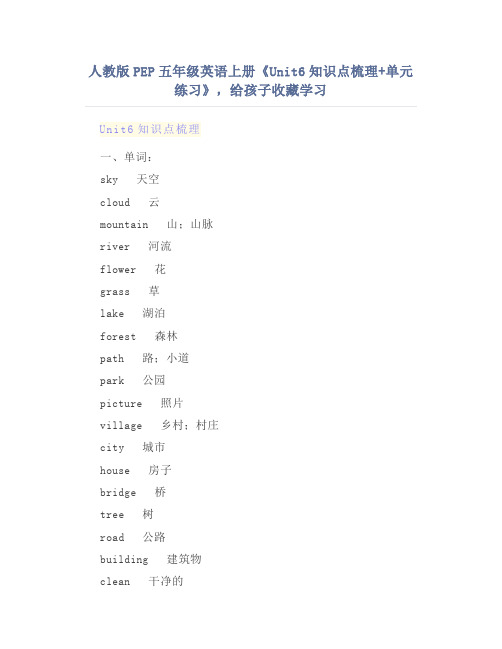
人教版PEP五年级英语上册《Unit6知识点梳理+单元练习》,给孩子收藏学习Unit6知识点梳理一、单词:sky 天空cloud 云mountain 山;山脉river 河流flower 花grass 草lake 湖泊forest 森林path 路;小道park 公园picture 照片village 乡村;村庄city 城市house 房子bridge 桥tree 树road 公路building 建筑物clean 干净的二.句子:1.There is a forest in the nature park.在自然公园里有一个森林。
2. Is there a forest in the park? 公园里面有一个森林吗?------ Yes, there is. 是的,有。
No, there isn’t。
不,没有。
(There be句型的一般疑问句:--- Is / Are there + 某物 + 某地?回答:Yes, there is / are. No, there isn t / aren t. )3. There are many small houses in my village. 在我的村庄里有许多小房子。
4.Are there any pandas in the mountains? 山里有熊猫吗?-----Yes, there are.是的,有/No,therearen’t. 不,没有。
三. 语法:1、There be 的单数形式在变为一般疑问句时,将助动词be提前,与there交换位置,如句中有第一人称代词,变为第二人称,将句末的句号变为问号,其他不变。
第二人称you you you you第三人称he himthey them she herit it人称代词主格作主语,表示动作的发出者。
人称代词宾格作宾语,表示动作行为的对象。
物主代词形容词性物主代词(my/your/his/her/its/our/their)+名词(用于修饰名词)名词性物主代词(mine/yours/his/hers/its/ours/theirs则相当于形容词性物主代词+名词。
五年级英语上册第6单元知识归纳
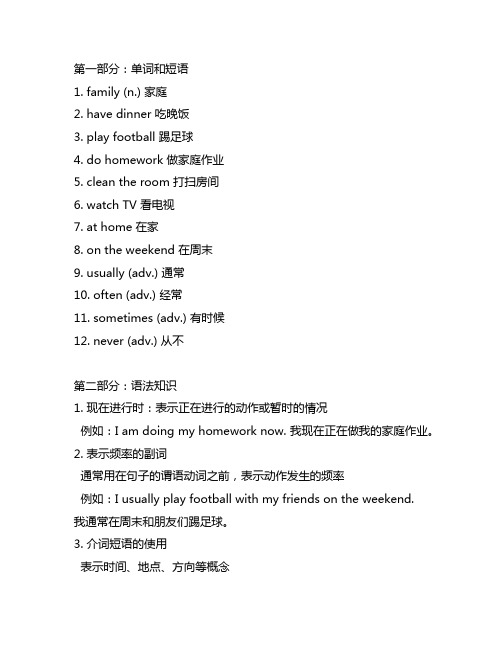
第一部分:单词和短语1. family (n.) 家庭2. have dinner 吃晚饭3. play football 踢足球4. do homework 做家庭作业5. clean the room 打扫房间6. watch TV 看电视7. at home 在家8. on the weekend 在周末9. usually (adv.) 通常10. often (adv.) 经常11. sometimes (adv.) 有时候12. never (adv.) 从不第二部分:语法知识1. 现在进行时:表示正在进行的动作或暂时的情况例如:I am doing my homework now. 我现在正在做我的家庭作业。
2. 表示频率的副词通常用在句子的谓语动词之前,表示动作发生的频率例如:I usually play football with my friends on the weekend.我通常在周末和朋友们踢足球。
3. 介词短语的使用表示时间、地点、方向等概念例如:at home 在家,on the weekend 在周末第三部分:对话A: What do you usually do at home?B: I usually do my homework and help my mom clean the room. A: What about on the weekend?B: I often play football with my friends on the weekend. How about you?A: I never play football. I usually watch TV at home.B: That sounds fun. Do you want to play football with us this weekend?A: Sure, I’d love to!第四部分:阅读理解My FamilyI have a happy family. There are four people in my family -- my father, my mother, my sister, and me. My father is a teacher. He teaches Chinese. He is very kind. My mother is a nurse. She works in a hospital. She is very helpful. My sister is a student. She is in Grade 3. She is very smart. We have dinner together every day. We often play football in the park on the weekend. I love my family. What about your family?第五部分:写作练习以“My Family”为题,写一篇短文描述自己的家庭情况,包括家庭成员的职业、特点、日常活动等内容。
- 1、下载文档前请自行甄别文档内容的完整性,平台不提供额外的编辑、内容补充、找答案等附加服务。
- 2、"仅部分预览"的文档,不可在线预览部分如存在完整性等问题,可反馈申请退款(可完整预览的文档不适用该条件!)。
- 3、如文档侵犯您的权益,请联系客服反馈,我们会尽快为您处理(人工客服工作时间:9:00-18:30)。
五年级英语上册第六单元知识点
一、单词
forest 森林,林区hill 山丘,小山
river 河;江mountain 高山,山岳
lake 湖;湖泊village 村庄,村镇
house 房屋tree 树,树木,乔木
bridge 桥go boating 去划船
people 人,人们rabbit 兔子
duck 鸭子animal 动物
high 高的children 孩子们
二、句型
1. Children, let’s go to the forest. 孩子们,让我们去森林吧。
2. —Is there a river in the forest? 森林里有河流吗?
—Yes, there is. 是,有的。
—No, there isn’t. 不,没有。
3. The nature park is so quiet! 自然公园这么安静!
4. There aren’t many people. (这里)人不多。
5. —Are there any tall buildings in the nature park? 自然公园例有高楼吗?
—Yes, there are. 是,有的。
—No, there aren’t. 不,没有。
6.—How many? 多少?
—Two. 两个。
7.Robin is at Mr. Jones’house. 罗宾在琼斯先生的房子里。
三、语法
1、some与any在肯定句、否定句及问句中的用法:
1)some+可数名词复数/不可数名词(用于肯定句中)
例:There are some books on the desk.
2)any+可数名词复数/不可数名词(用于否定句或疑问句中)
例:There aren’t any people in the forest.
Are there any tall buildings in the natures park?
2、people 人,人们——集体名词,明为单数,实为复数,词末不能加-s 例:There are many people in the park.
【本文部分素材和图片来源于网络,侵删】。
